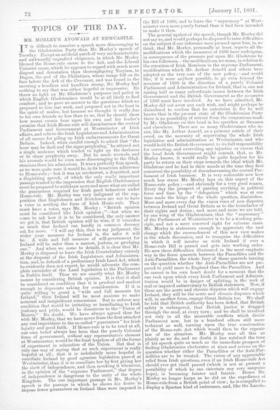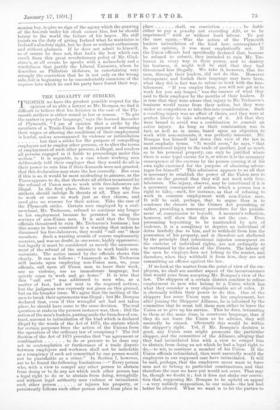TOPICS OF THE DAY
MR. MORLEY'S AVOWALS AT NEWCASTLE.
IT is difficult to conceive a speech more discouraging to the Gladstonian Party than Mr. Morley's speech of Tuesday. Except an artificial patch of very uncharacteristic and awkwardly engrafted eloquence, in which Mr. Morley likened the Home-rule cause to the Ark, and the Liberal Unionist cause, which he appears to regard with much more disgust and detestation than thoroughgoing Toryism, to Dagon, the god of the Philistines, whose image fell on its face before the Ark of the Covenant, and was found in the morning a headless and handless stump, Mr. Morley bad nothing to say that was either hopeful or impressive. He threw no light on Mr. Gladstone's purposes and policy in which English Gladstonians would be at all likely to find comfort ; and he gave no answer to the questions which we proposed to him last week, and proposed not in the least in the spirit of malice. but because we thought it really due to his own friends no less than to us, that he should show how recent events bear upon his own and his leader's promise that Irish Home-rule will disembarrass the central Parliament and Government at Westminster of Irish affairs, and relieve the Irish Legislature and Administration of all excuse for piling up Irish embarrassments for Great Britain. Indeed, while candid enough to admit that "the hour may be dark and the signs perplexing," he uttered not a single sentence which tended to light up the darkness or to chase perplexity away. But he made avowals, and his avowals would be even more discouraging to the Glad- stonians than his admissions. It was a perfectly firm speech, as we were quite sure it would be, in its tenacious adherence to Home-rule ;—but it was an incoherent, a dispirited, and a dispiriting speech, of which the only really important passage tended to the impression that English Gladstonians must be prepared to withdraw more and more what are called the guarantees required for Irish good behaviour under Home-rule. Mr. Morley was very indignant at the sup- position that Englishmen and Scotchmen are not to have a voice in settling the form of Irish Hoirie-rule. They must have a voice, says Mr. Morley ; "British opinion must be considered like Irish opinion ; "—but when we come to ask how it is to be considered, the only answer we get is, that British opinion will be wise, if it concedes so much that Ireland can hardly in common decency ask for more. "I will say this, that in my judgment, the wider your measure for Ireland is, the safer it will be. A wide and full measure of self-government for Ireland will be safer than a narrow, jealous, or grudging one." And when we come to details, it is clear that Mr. Morley is disposed to leave the Irish Constabulary entirely at the disposal of the Irish Legislature and Administra- tion, and, in default of a preliminary Irish Land Act, which he evidently does not expect, he would advocate the com- plete surrender of the Land legislation to the Parliament in Dublin itself. Thus we see exactly what Mr. Morley means by considering British opinion. It is that it shall be considered on condition that it is prudent and modest enough to deprecate asking for consideration. If it is quite willing to grant a " wide and full measure for Ireland," then Ireland will be most anxious to make nominal and insignificant concessions. But to enforce any condition that would be irritating or humiliating to Irish jealousy and pride, would be disastrous to the " Union of Hearts." No doubt. We have always agreed thus far with Mr. Morley, that we have never from the first attached any real importance to the so-called " guarantees " for Irish loyalty and good faith. If Home-rule is to be tried at all, our own belief always has been that the purely Colonial form of government, without any representative element at Westminster, would be the least hopeless of all the forms of experiment in relaxation of the Union. But that is only one way of saying that no such experiment is really hopeful at all ; that it is indefinitely more hopeful to conciliate Ireland by good agrarian legislation passed at Westminster, than it is to conciliate her by first giving her the show of independence, and then revoking it whenever, in the opinion of the " supreme Parliament," that degree of independence is dangerous to the unity of the whole Kingdom. The one important passage in Mr. Morley's speech is the passage in which he shows his desire to impose fewer guarantees on Ireland than were imposed in the Bill of 886, and to leave the " supremacy " at West- minster even more purely formal than it had been intended to make it then.
The general upshot of the speech, though Mr. Morley did not say so, and would perhaps be disposed to raise difficulties on the subject if our inference were pressed upon him, is, we think, that Mr. Morley, personally at least, regrets all the modifications which the measures of 1886 have undergone, in consequence of the pressure put upon Mr. Gladstone by his own followers,---the modifications, we mean, in relation to the retention of Irish Members in the supreme Parliament,. modifications which Mr. Arthur Arnold and others have adopted as the very core of the new policy,--and would like, if it were anyhow possible, to go even beyond the- measure of 1886 in the direction of a purely Colonial Parliament and Administration for Ireland, that is, one not raising half so many subordinate issues between the Irish Government and the British Government as the measures.
of 1886 must have involved. As we have admitted, Mr.
Morley did not avow any such wish, and might perhaps be• disinclined to confess that be entertains it, for he well knows that in the present state of the Gladstonian Party there is no possibility of retreat from the concessions made by Mr. Gladstone on this head in his speethes at Swansea and elsewhere. There are so many Gladstonians who in- sist, like Mr. Arthur Arnold, as a primary article of their creed, on the necessity of supervising the whole Irish legislation and administration at Westminster, and who• would hold the British G overnment to its full responsibility for correcting and overruling any injustice or excess that the local Irish Government might commit, that, as Mr. Morley knows, it would really be quite hopeless for his party to return on their steps towards the ideal which Mr. Gladstone and he had in their minds at the time they first conceived the possibility of disembarrassing the central Par- liament of Irish business. It is very noticeable now how much less stress Mr. Morley lays on this aspect of the Home-rule policy ;—and obviously for a very good reason. Every day the prospect of gaining anything in political force and time by the " delegation " which was at one time made the hinge of the whole question, diminishes. More and more every day the vision rises of new disputes between Ireland and Great Britain as to the boundaries of their rights and duties ; and more and more we are told, by one wing of the Gladstonians, that the " supremacy " of the Parliament at Westminster is to be a working prin- ciple, and not a mere reserved right for extreme cases. Mr. Morley is statesman enough to appreciate the vast change which the encroachment of this new view makes in the whole discussion, and to recognise the difficulties in which it will involve us with Ireland if ever a Home-rule Bill is passed and gets into working order. He sees these difficulties illustrated in the most emphatic way in the fierce quarrels between the Parnellites and the Anti-Parnellites, the whole fury of these quarrels turning on the question whether the Anti-Parnellites are not pre- pared to yield more to England than the Parnellites. And he cannot in his own heart doubt for a moment that the one rock upon which every Irish Parliament and Adminis- tration would be in danger of splitting, is the rock of real or imputed subserviency to British statesmen. Now, if these are the acute and chronic disputes which will engage Ireland, they will be the acute and chronic disputes which will, in another form, engage Great Britain too. We shall be told that British authority has been defied, that British safety is endangered, that British justice is dragged through the mud, at every turn ; and we shall be involved not only in all the miserable conflicts which divide Parliament now, but in a hundred others still more technical as well, turning upon the true construction of the Home rule Act which would then be the organic law of the situation. Mr. Morley sees all this as plainly as we do, and no doubt it has subdued the tone of his speech quite as much as the immediate prospect of finding Gladstonian electorates at sixes and sevens on the question whether either the Parnellites or the Anti-Par- nellites are to be trusted. The vision of any appreciable relief from Irish questions, even if an Irish Home-rule Act should ever get itself passed (which is not at present a possibility of which he can entertain any very sanguine hope), is becoming fainter and fainter. Hence Mr. Morley no longer harps as he did on the expediency of Home-rule from a British point of view ; he is compelled to display a Spartan kind of endurance, and, like the Lacede- monian boy, to give no sign of the agony which the gnawing of the fox-cub under his cloak causes him, lest he should betray to the world the failure of his hopes. He still insists on the duty of giving Ireland what he maintains is Ireland's absolute right, but he does so without enthusiasm and without gladness. If he does not admit to himself, as of course he does not, that bad's the best which can result from this great revolutionary policy of Mr. Glad- stone's, at all events he speaks with a melancholy and a wistfulness that justify the Liberal Unionists, whom he describes as Philistine idolaters, in entertaining very strongly the conviction that he is not only on the wrong side, but is beginning to be uncomfortably conscious of the impasse into which he and his party have found their way.







































 Previous page
Previous page